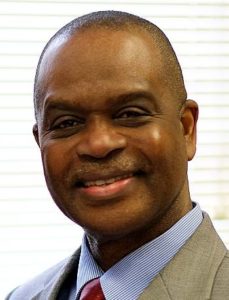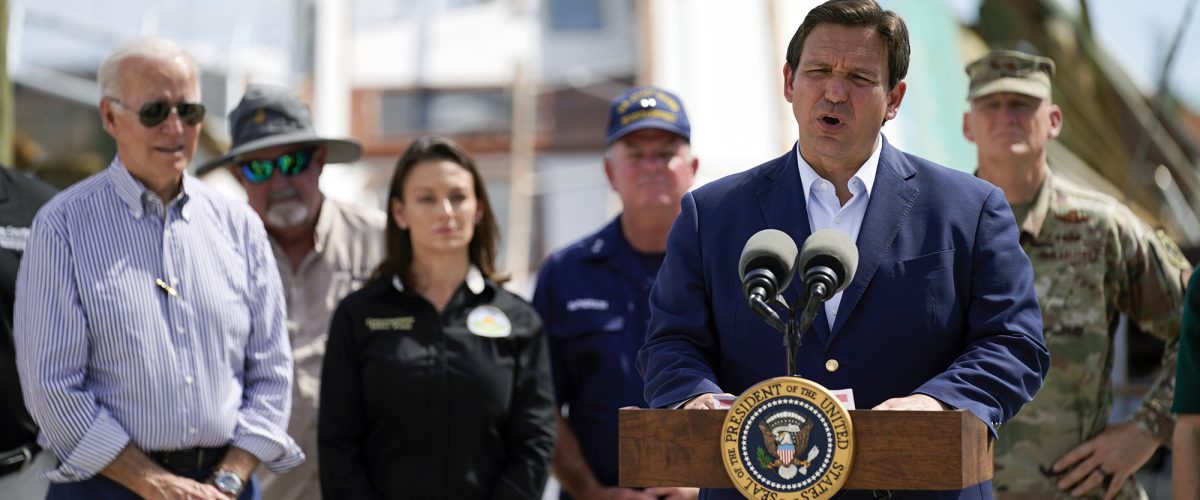When the AIDS epidemic descended upon cities on America’s West and East Coast (but not in the American South just yet), religious “authorities” such as Pat Robertson, Jerry Falwell and Billy Graham declared it to be God’s judgment for sin. Graham later retracted his comments, but the others never did.
When the inflictions of 9/11 were worst in New York, some of the usual religious suspects were sure that this, again, was God’s wrath. When the slaughter of innocent kids happened at Sandy Hook, James Dobson found a way to say God has allowed judgment to fall on America. These religionists never hesitated to suggest that the city or state location of these tragedies were for their sins more than America’s.

Michael Friday
The usual fundamentalist suspects — and some unusual ones, from both Islam and Judaism — were at it again when Killer Katrina visited New Orleans, citing that “sin city” as the cause for the supposedly divine wrath of Katrina.
When Superstorm Sandy ravaged the Northeast in 2012, leaving billions of dollars and scores of people dead, Sen. Rand Paul was in no mood for empathy. Rand ranted that no federal funds should be released to help. A few years later, when Hurricane Harvey demolished Texas and Louisiana, Paul repeated his callous posture. Yet, when his constituency in Kentucky, a mere decade later, found itself assaulted by storms that killed 70 people, Paul was found shamelessly appealing to the federal government for help.
When weary Venezuelans arrived over the Texas border as legitimately landed refugees, Florida Gov. Ron DeSantis found a way to fly them out, veritably dumping them like garbage on Martha’s Vineyard, thereby copy-catting his equally heartless colleague in Texas who has bused countless legitimate refugees northward, to — presumably — “sin cities” of New York, Chicago and others. This same Ron DeSantis, when he was a U.S. Congressman from Florida, joined Rand Paul in voting against federal support for states hit by Hurricane Sandy; so did Florida Sen. Marco Rubio.
Yet as Hurricane Ian made its unwelcome visit to Florida last week, DeSantis welcomed any help the American president can render. DeSantis and Biden appeared together before the news cameras.
And, by the way, do not forget that these men all are climate change deniers who put their mouths and their votes behind every move to obstruct effective action, retard responsible policy and deny considerable money to save our planet and their vulnerable states.
“These men all are climate change deniers who put their mouths and their votes behind every move to obstruct effective action.”
In the Gospel of Luke, Jesus had an acerbic answer for some folks who — the format of his question suggests — presumed themselves better than others and demonstrated this penchant for apportioning divine judgment where it may not reside. He asked: “Do you think that because these Galileans (who were slaughtered by Pilate) suffered in this way [because] they were worse sinners than all other Galileans? No … or those 18 who were killed when the tower of Siloam fell on them — do you think they were worse offenders than all the others living in Jerusalem? No.”
I thought of these questions and answers as I wondered about the American religionists, Pharisees and acclaimed evangelicals who did not hesitate to pontificate on sin and judgment when tragedy befell certain select locations or who treat such places as appropriate dumping grounds for what they see as human garbage. I wondered what their opinion shall now be about Ian-battered Florida?
Aha! I know the answer! Fundamentalists never declare God’s judgment when Kentucky, the Midwest, the Carolinas, Georgia, Texas and Florida — you know, the good, holy, biblical, Bible-belt South (with the carved-out exception of “sinful” New Orleans) — are hit by any tragedy, whether weather-related or even mass-shooting related.
Likewise, it is curious that James Dobson, a resident of Colorado, with about 20 mass shootings in the past 20 years, ventured to pontificate on God’s judgment regarding Sandy Hook (Connecticut has had only one in the same period), while giving Colorado a free pass on God’s judgment.
I really don’t expect it, but I am hoping that as DeSantis wrestles with the challenges of governing a state, he will be sufficiently chastened for his previous behaviors that some say are only posturing and auditioning to be president. And why don’t I expect it? Well, “Can a leopard change its spots?” asks the prophet Jeremiah.
DeSantis has been consistently spotted throughout his entire gubernatorial term. I believe in salvation and transformation; but I also know the corruption of power and extent of depravity. It’s the same question that assails my mind when I notice the span of time since fundamentalists have been seeing divine judgment everywhere else other than their own backyard, for “horrible” sins other than their own “respectable” sins.
For in America, it still seems like every sin (greed, lying, stealing, dehumanizing, slandering, depriving, conniving, conning, political trafficking, vote-stealing, voter-registration cancelling and much more) — so long as it has nothing to do with sex, sexuality or the results of sex and sexuality — is respectable, to the extent that even being female, and being LGBTQ appear, in themselves, to be sin and sinful. But that’s for a different article and author; this is enough hypocrisy-chasing for today.
Michael P. Friday serves as president of the American Baptist Churches of Connecticut and as interim pastor of Noank Baptist Church. He is a leadership strategist and consultant, with former pastorates in Trinidad and Tobago, Jamaica, Nebraska, Pennsylvania, and New York. He is author of the book, And Lead Us Not Into Dysfunction: The Good, The Bad, And The Ugly of Church Organizations And Their Leaders.
Related articles:
Blackaby says tsunamis God’s judgment; missions experts question theology


